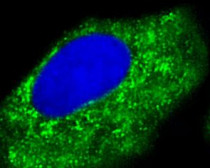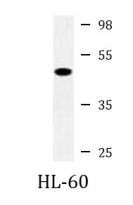ARG54820
anti-ATG4D antibody
anti-ATG4D antibody for ICC/IF,Western blot and Human
Cancer antibody; Cell Biology and Cellular Response antibody; Cell Death antibody; Metabolism antibody
Overview
| Product Description | Mouse Monoclonal antibody recognizes ATG4D |
|---|---|
| Tested Reactivity | Hu |
| Tested Application | ICC/IF, WB |
| Host | Mouse |
| Clonality | Monoclonal |
| Clone | 222CT15.4.1 |
| Isotype | IgG1, kappa |
| Target Name | ATG4D |
| Immunogen | ATG4D recombinant protein. |
| Conjugation | Un-conjugated |
| Alternate Names | Autophagin-4; Cysteine protease ATG4D; AUT-like 4 cysteine endopeptidase; APG4D; Autophagy-related cysteine endopeptidase 4; APG4-D; EC 3.4.22.-; AUTL4; Autophagy-related protein 4 homolog D |
Application Instructions
| Application Suggestion |
|
||||||
|---|---|---|---|---|---|---|---|
| Application Note | * The dilutions indicate recommended starting dilutions and the optimal dilutions or concentrations should be determined by the scientist. | ||||||
| Positive Control | HL-60 |
Properties
| Form | Liquid |
|---|---|
| Purification | Purification with Protein G. |
| Buffer | PBS and 0.09% (W/V) Sodium azide |
| Preservative | 0.09% (W/V) Sodium azide |
| Storage Instruction | For continuous use, store undiluted antibody at 2-8°C for up to a week. For long-term storage, aliquot and store at -20°C or below. Storage in frost free freezers is not recommended. Avoid repeated freeze/thaw cycles. Suggest spin the vial prior to opening. The antibody solution should be gently mixed before use. |
| Note | For laboratory research only, not for drug, diagnostic or other use. |
Bioinformation
| Database Links | |
|---|---|
| Gene Symbol | ATG4D |
| Gene Full Name | autophagy related 4D, cysteine peptidase |
| Background | Autophagy is the process by which endogenous proteins and damaged organelles are destroyed intracellularly. Autophagy is postulated to be essential for cell homeostasis and cell remodeling during differentiation, metamorphosis, non-apoptotic cell death, and aging. Reduced levels of autophagy have been described in some malignant tumors, and a role for autophagy in controlling the unregulated cell growth linked to cancer has been proposed. This gene belongs to the autophagy-related protein 4 (Atg4) family of C54 endopeptidases. Members of this family encode proteins that play a role in the biogenesis of autophagosomes, which sequester the cytosol and organelles for degradation by lysosomes. Alternative splicing results in multiple transcript variants. [provided by RefSeq, Jul 2013] |
| Function | Cysteine protease ATG4D: Cysteine protease required for the cytoplasm to vacuole transport (Cvt) and autophagy. Cleaves the C-terminal amino acid of ATG8 family proteins MAP1LC3 and GABARAPL2, to reveal a C-terminal glycine. Exposure of the glycine at the C-terminus is essential for ATG8 proteins conjugation to phosphatidylethanolamine (PE) and insertion to membranes, which is necessary for autophagy. Has also an activity of delipidating enzyme for the PE-conjugated forms. Cysteine protease ATG4D, mitochondrial: Plays a role as an autophagy regulator that links mitochondrial dysfunction with apoptosis. The mitochondrial import of ATG4D during cellular stress and differentiation may play important roles in the regulation of mitochondrial physiology, ROS, mitophagy and cell viability. [UniProt] |
| Cellular Localization | Cysteine protease ATG4D: Cytoplasm. |
| Research Area | Cancer antibody; Cell Biology and Cellular Response antibody; Cell Death antibody; Metabolism antibody |
| Calculated MW | 53 kDa |
| PTM | Cleaved by CASP3 during apoptosis which leads to increased activity. The cleavage by CASP3 reveals a cryptic mitochondrial targeting sequence immediately downstream of their canonical caspase cleavage sites which leads to mitochondroal import of the protein. |
Images (2) Click the Picture to Zoom In







